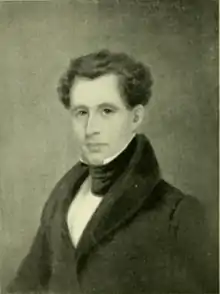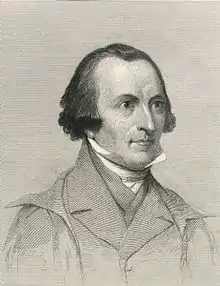James Gates Percival
James Gates Percival (September 15, 1795 – May 2, 1856) was an American poet, surgeon, and geologist, born in Berlin, Connecticut, and died in Hazel Green, Wisconsin.[1][2][3]

James Gates Percival | |
|---|---|
 | |
| Born | September 15, 1795 Berlin, Connecticut |
| Died | May 2, 1856 (aged 60) Hazel Green, Wisconsin |
| Citizenship | American |
| Genre | Poetry |
| Signature | |
Biography
James Gates Percival was a precocious child and a versatile, yet morbid and impractical man. He had a remarkable ability to write verse on various subjects and in almost every known meter. His sentimentalism and dazzling diction appealed to a wide audience, earning him a reputation as the foremost poet in the United States during the 1820s. Some of his most famous poems include "Prometheus," "The Coral Grove," and "The Graves of the Patriots."[4] He was also a renowned geologist.
Percival entered Yale College at the age of 16 and graduated at the head of his class at the age of 20. After graduating, he pursued a career in medicine and relocated to Charleston, South Carolina. In 1823, a volume of his collected poems was published in New York and London.[5] In 1824, he briefly served as a professor of chemistry at West Point before resigning and dedicating several years to assisting Noah Webster in editing his American Dictionary of the English Language, published in 1828.
In 1835, the governor of Connecticut commissioned Percival to prepare a geological survey of the state, which he completed and published in 1842. In 1854, he was appointed as the State Geologist for Wisconsin and tasked with conducting a similar geological survey. The first annual report was issued in 1855, but while preparing the second annual report, Percival fell ill and passed away in May 1856. Most of his life was spent at his home in New Haven, Connecticut. Following his death, he was the subject of an admiring biography by Julius H. Ward.
Select works
- Poems (1821)
- Clio. No. 1-2 (1822)
- Prometheus, Part II, with Other Poems (1823)
- Poems (1823)
- A Geographical View of the World Embracing the Manners, Customs, and Pursuits of Every Nation, ed. (1825)
- Poem delivered before the Connecticut Alpha of the Phi Beta Kappa Society (1826)
- Clio. No. 3 (1827)
- Report on the Geology of the State of Connecticut (1842)
- The Dream of a Day (1843).[6]
- Annual Report of the Geological Survey of the State of Wisconsin (1855-1856)
- A short poem by him, "The Language of Flowers", was set to music by the English composer Edward Elgar at the age of fourteen.[7]
References
- Kelly, Howard A.; Burrage, Walter L. (eds.). . . Baltimore: The Norman, Remington Company.
- History of Grant County, Wisconsin. Chicago: Western Historical Company, 1881, pp. 576-581.
- "A tribute to james gates percival, poet, scientist, linquist, buried at hazel green | Newspaper Article/Clipping". January 2012.
- Hay, John (2020). "The Limits of Recovery: The Failure of James Gates Percival". Early American Literature. 55 (1): 111–144. doi:10.1353/eal.2020.0006. ISSN 1534-147X. S2CID 213435957.
- "U.S. Poet of Obscurity: James Gates Percival". The Salt Lake Tribune. September 20, 1959. p. W15. Retrieved April 28, 2017 – via Newspapers.com.

- "James Gates Percival".
- Diana McVeagh, Elgar the Music Maker, p. 3 "Elgar composed the song 'The Language of Lowers' (1872) when he was not quite fifteen. The verses are by the American poet and botanist, James Gates Percival."}
Sources
- McVeagh, Diana M. (2007). Elgar the Music Maker. Woodbridge, Suffolk: Boydell Press. ISBN 978-1-84383-295-9.
- The Poetical Works of James Gates Percival. With a Biographical Sketch. Boston: Ticknor & Fields. 1859.
- Life and Letters of James Gates Percival, by J.H. Ward (Boston: Ticknor & Fields, 1866).
 This article incorporates text from a publication now in the public domain: Cousin, John William (1910). "Percival, James Gates". A Short Biographical Dictionary of English Literature. London: J. M. Dent & Sons – via Wikisource.
This article incorporates text from a publication now in the public domain: Cousin, John William (1910). "Percival, James Gates". A Short Biographical Dictionary of English Literature. London: J. M. Dent & Sons – via Wikisource.
- Chisholm, Hugh, ed. (1911). . Encyclopædia Britannica. Vol. 21 (11th ed.). Cambridge University Press.
- John Hay, "The Limits of Recovery: The Failure of James Gates Percival," Early American Literature, vol. 55, no. 1 (2020)
External links
- James Gates Percival Collection. Yale Collection of American Literature, Beinecke Rare Book and Manuscript Library.